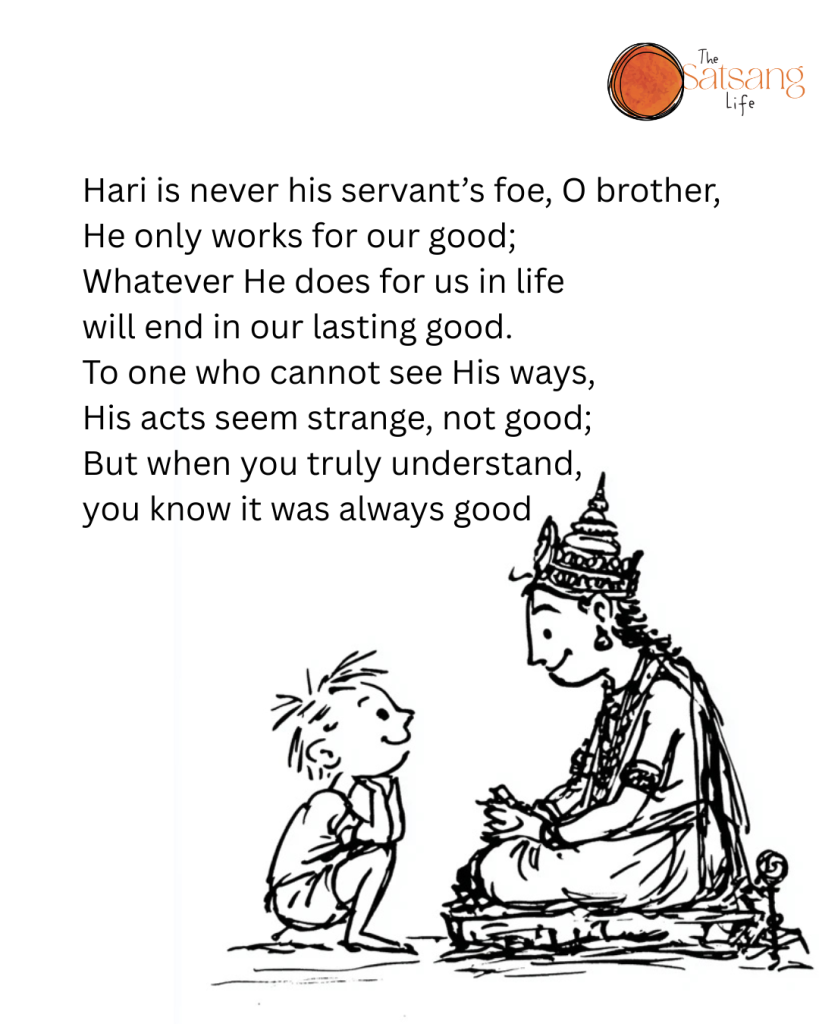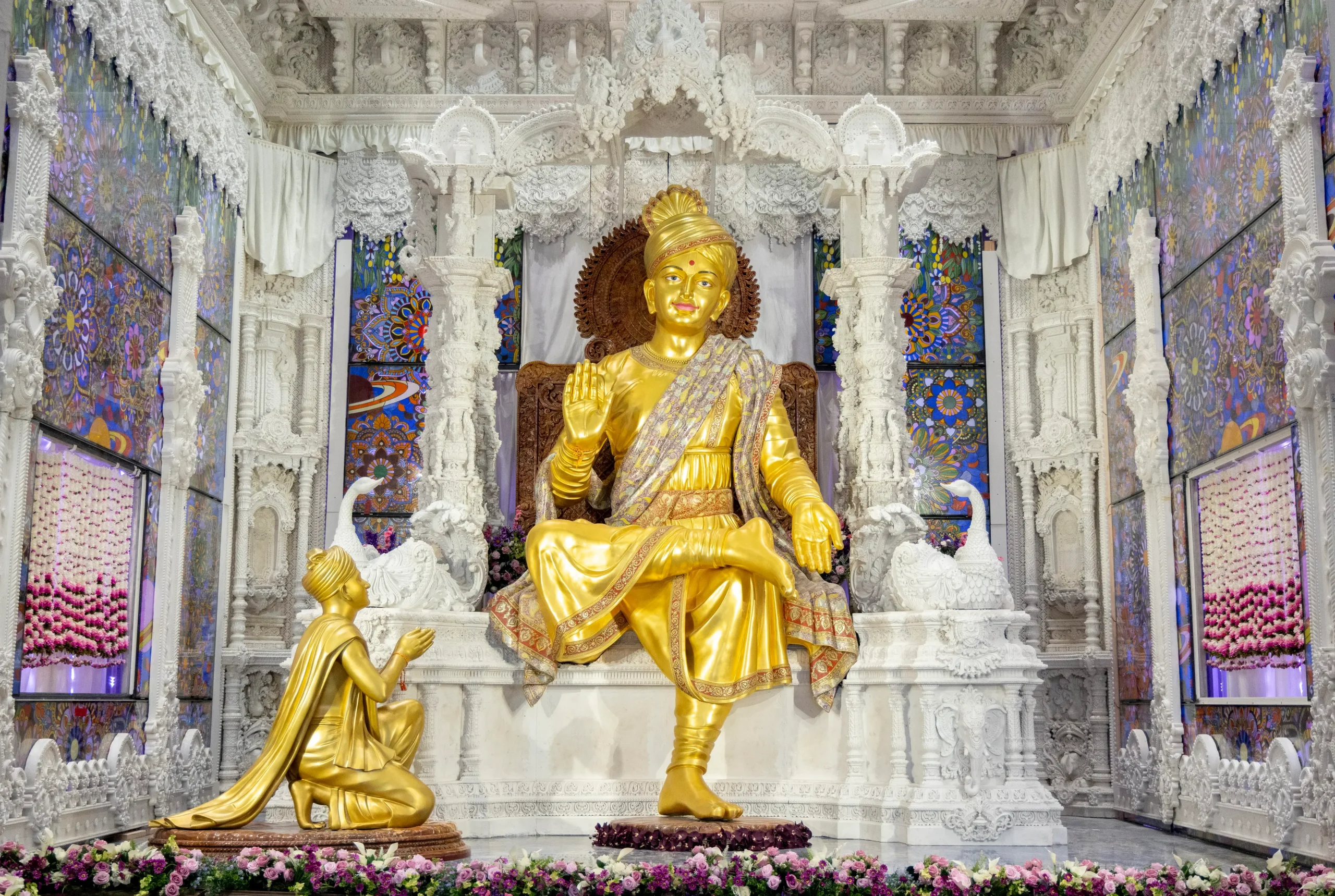




The verses of Nishkulānand Swami remind us of a truth every spiritual seeker eventually discovers: God’s ways are not always obvious, but they are always compassionate.
1. God Is Never Our Enemy—Even When Life Feels Difficult
Understanding God’s Intentions
We often interpret life’s challenges as obstacles, punishments, or evidence that God is distant. But Nishkulānand Swami flips this narrative entirely. He asserts that God is never against His devotee—His every act is meant for our spiritual upliftment.
“Hari is never his servant’s foe… Whatever He does for us in life will end in our lasting good.”
For the bhakta walking the path of liberation, this perspective becomes a lifeline. If God is always well-intentioned, then even the uncomfortable twists of fate are quietly shaping our soul toward its highest good.
Why God’s Plan Seems Confusing
From the limited vantage point of human understanding, divine decisions can feel strange—even unfair. But Swami explains: when we deepen our understanding, clarity eventually arrives.
“To one who cannot see His ways, His acts seem strange… But when you truly understand, you know it was always good.”
This is the essence of shraddhā: trust beyond logic.
2. Comfort Can Be a Spiritual Trap
How Prosperity Breeds Forgetfulness
Nishkulānand Swami makes a provocative observation: people rarely remember God during periods of comfort. When life gifts us wealth, status, relationships, and success, we become absorbed in them.
“When life is full of joy, who calls on Hari as they should?”
In our modern lives—career growth, social validation, abundant opportunities—the same dynamic plays out. Comfort dulls spiritual alertness; abundance can inflate ego.
The Drift Toward Ego and Attachment
Swami warns that with increased luxury comes increased forgetfulness of Bhagwan. Enjoyment is not the issue—attachment is. Just as a king wrapped in royal robes forgets his true self, we too can be intoxicated by our own achievements.
This message is a wake-up call for devotees: stay grounded in remembrance even when life is going well.
3. What the World Calls “Pleasure” Isn’t Always Good for the Soul
Why God Withholds Certain Comforts
A recurring theme in the verses is this: God protects us not only by giving, but by withholding.
“What the world calls pleasure is pain to the servant… So Hari, thinking of his soul, withholds those pleasures He could.”
True pleasure is spiritual—not sensory. So when Bhagwan or the Guru limits our worldly comfort, it may be an act of grace designed to nurture freedom rather than bondage.
Why People Misunderstand Spiritual Restraint
Swami points out a psychological truth: those attached to worldly life often misjudge saints and spiritual discipline, assuming denial is suffering or repression.
But such criticism stems from misunderstanding, not malice:
“Souls entangled in worldly ways can’t see this loving good… and for no cause blame the sant.”
For the sincere bhakta, it’s important to stand strong in spiritual conviction even when others may not understand one’s choices.
4. For Saints, Pain Itself Becomes a Path to Bliss
Seeing Suffering Through a Spiritual Lens
The final verse reveals an extraordinary spiritual principle: for those deeply connected to God, bodily discomfort is not a setback—it’s a source of joy. Why? Because even amidst suffering, the saint’s mind remains absorbed in God.
“Pain in this passing body is joy for the sant… when through every ache his mind on Hari stands firm.”
This is not the glorification of pain—it is the glorification of unwavering devotion.
The Mercy Hidden in Every Experience
Swami concludes that this entire worldview—seeing God’s grace in both joy and hardship—comes from Dayānāth, the compassionate Lord.
Those who truly understand His mercy naturally echo the same sentiment:
“Whoever has really understood will say the same: surely this is good.”
This is the spiritual maturity devotees strive for: the ability to see divinity in every circumstance.
| Verse | Translation |
| Dāsnā dushman Hari ke’dī hoye nahi, Bhāī je kāī karashe te sukh thāshe; Aṇasamaje aṭpaṭu e lāge kharu, Paṇ samazīne juve to satya bhāse… Dās. 1 | Hari is never his servant’s foe, O brother, He only works for our good; Whatever He does for us in life will end in our lasting good. To one who cannot see His ways, His acts seem strange, not good; But when you truly understand, you know it was always good |
| Bhāī sukhmā Hari kaho kene sāmbharyā, Jo dhan rāj ne parivār pāme; Rājnā sājmā Rāmjī visare, Vaḷī mālnā madnā madmā matta vāme… Dās. 2 | My brother, when life is full of joy, who calls on Hari as they should? When wealth and power and family come, who keeps their heart where it should? Wrapped in the robes and seat of a king, they let the Lord be forgot for good; And drunk on the pride of all their wealth, they reel far away from the good… |
| Bhāī sansārnā sukh te dukh chhe dāsne, Teh Hari vichārīne nahī ja āpe; Paṇ jaktanā jīv te jukti jāṇe nahi, Aṇachhatā dāsnā doṣh sthāpe… Dās. 3 | My brother, what world calls “pleasure” is pain to the servant who’s good; So Hari, thinking of his soul, withholds those pleasures He could. But souls entangled in worldly ways can’t see this loving good; For no cause at all they blame the sant, and stamp him with faults for good… |
| Bhāī dehtaṇu dukh teh sukh chhe santne, Jo akhanḍ varati vaḷī em rahe; Niṣhkuḷānand e dayā Nāthnī jāṇaje, Je samajyā te to em ja kahe… Dās. 4 | My brother, pain in this passing body is joy for the sant as it should, When, even through every ache and sting, his mind on Hari stands firm and good. O Nishkulānand, this is the mercy of Dayānāth, the Lord who is good; Whoever has really understood will say the same: “Surely, this is good.”… |
Introduction on Paramhansa (Text): https://www.baps.org/About-BAPS/TheFounder%E2%80%93BhagwanSwaminarayan/Legacy/Disciples/Paramhansas.aspx
Follow our Socials: Instagram | Youtube | Tiktok | Telegram | Whatsapp | Spotify | Apple Podcast














+ There are no comments
Add yours